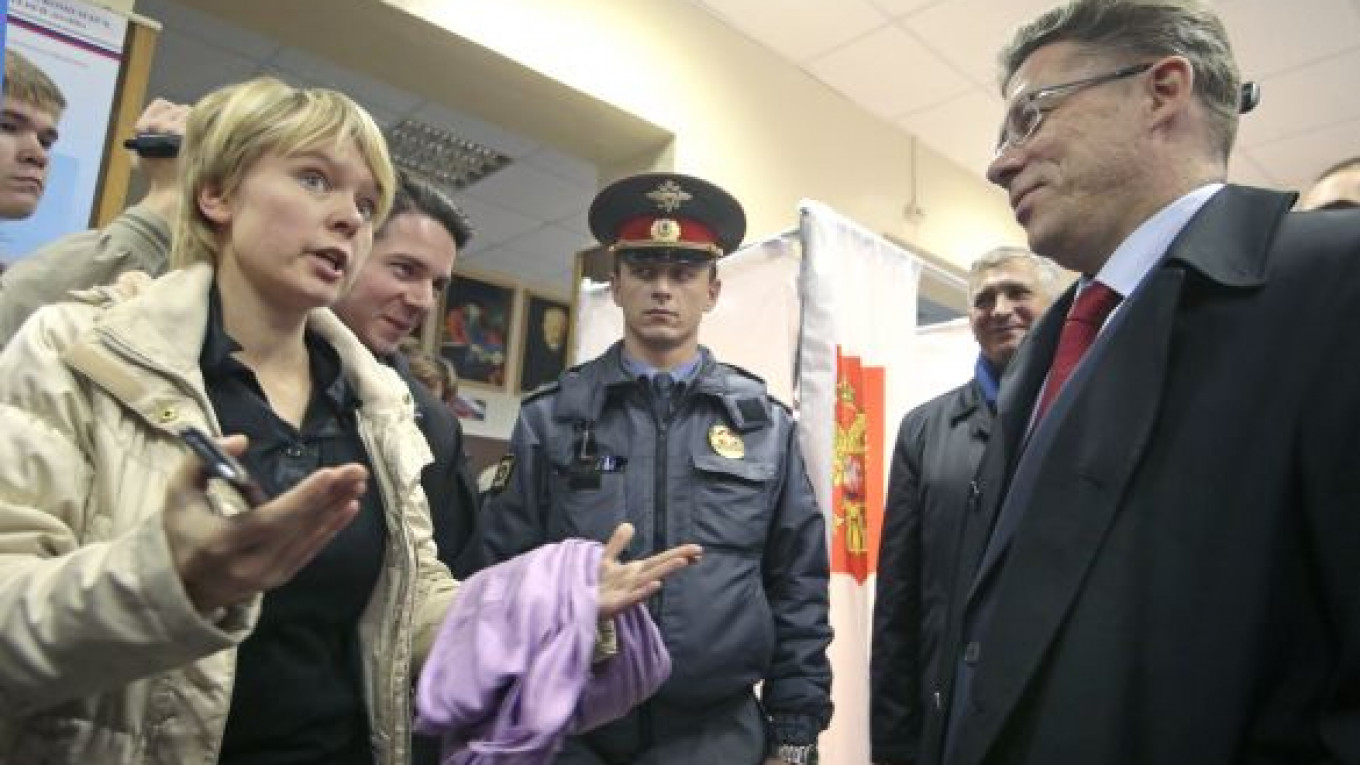KHIMKI, Moscow Region — As the mayoral election polls closed Sunday in this city of 200,000 just north of the capital, the Kremlin-backed incumbent was set to win.
But the vote, which only drew about a quarter of the city’s populace, did not go unscathed, with independent monitoring group Golos reporting violations and prominent opposition candidate Yevgenia Chirikova accusing officials of manipulating voter lists.
According to a state-administered exit poll, United Russia’s Oleg Shakhov, appointed acting mayor in August following the removal of the highly unpopular Vladimir Strelchenko, garnered nearly 44 percent of the vote. Analysts said Shakhov’s main advantage was strong support from the region’s charismatic governor, Sergei Shoigu.
Chirikova, representing the “In Defense of the Khimki Forest” movement, was a likely second with 20.6 percent of the VTsIOM agency exit poll, Interfax reported. Chirikova is a longtime resident of Khimki, unlike Shakhov, and she is most renowned for organizing protests against a highway planned to cut across local forestland.
Kremlin-connected Oleg Mitvol, a former deputy head of the federal natural resources watchdog who ran under the aegis of the “Green Alliance — People’s Party,” took third in the exit poll with 14.4 percent. Although an environmentalist, Mitvol did not figure prominently in the highway dispute, a key issue of the election.
Communist Party candidate Leonid Vinogradov got 7.1 percent, according to the exit poll, while Korrozia Metalla (Corrosion of Metal) rock band frontman Sergei Troitsky, whose bio on the ballot said he was battling the “forces of evil,” received 2.9 percent.
Official election posters published by the Central Elections Commission and displayed at polling stations across town had misspelled Troitsky’s last name “Trotsky” — as in radical Marxist revolutionary Leon Trotsky. Two polling station workers downtown told The Moscow Times that they had to correct several posters by hand.
The other eight candidates got less than 2 percent in the exit poll, which surveyed about a fifth of the voter turnout and had a margin of error below 2.5 percent.
Vyacheslav Medvedev, local head of the opposition Yabloko party, said that at the polling station where he was an observer, Shakhov had a strong lead, with Mitvol second and Chirikova third. He praised the governor for creating conditions for a clean vote in a city long known for election manipulations.
“It is almost a unique case when the regional administration is interested in holding honest elections,” Medvedev said, adding that authorities made sure that places for election observers were set at the polling stations.
The Central Elections Commission said 3,000 observers came to monitor the election, a record number, according to the commission.
But the regional coordinator of Golos (Voice), an independent election-monitoring watchdog, said the Khimki election had more violations than in other towns in the Moscow region.
“The elections went rather smoothly everywhere, except Khimki, where … some observers were removed and some provocations occurred,” Golos regional coordinator Konstantin Ivanov said in comments carried by Interfax. In Pushkino, Mytishchi and Sergiyev Posad, for instance, the elections were calm, he said.
Several people complained to The Moscow Times that they had received phone calls late Saturday night and early Sunday morning with recorded messages urging them to vote for the incumbent.
“After I got this call twice during the night, I got really mad. This is a real violation,” said Vladimir, a local engineer in his 50s. He said he voted for the opposition candidate. Another voter, Sergei, aged 47, believed the call was a “provocation” against Shakhov, whom he voted for.
Shakhov, who was visiting a downtown polling station, told The Moscow Times that his campaign workers could not have been behind the calls. “No sane person is going to call people in the middle of the night,” he said.
Several voters said they voted for Shakhov, instead of the opposition, because he had political ties. “Shakhov has leverage in powerful circles,” Alla Nikolayevna, a woman in her mid-40s, said while leaving a polling station.
Alexander Nagorny, a publisher of the local Vse v Kurse newspaper, said that while Chirikova gained popularity with the protest movement she was not widely seen as a potential mayor.
“She has a task to become a federal politician,” Nagorny said of Chirikova, who was at first reluctant to run for mayorship but entered the race after support from opposition leaders, including protest leader Alexei Navalny, who also came to Khimki on Sunday to observe voting.
Chirikova, who like her main opponent Shakhov was running around the polling stations to get reports from her observers, submitted two complaints with a local court over violations at the polling stations.
She said that at two of the polling stations local commissions listed an additional number of voters. She also said on Twitter that some of her observers suffered personal threats at polling stations.
Shakhov, at the downtown polling station, told The Moscow Times that Chirikova’s behavior was “electoral PR.” “She is trying to put on a political show,” he said.
Related articles:
A Message from The Moscow Times:
Dear readers,
We are facing unprecedented challenges. Russia's Prosecutor General's Office has designated The Moscow Times as an "undesirable" organization, criminalizing our work and putting our staff at risk of prosecution. This follows our earlier unjust labeling as a "foreign agent."
These actions are direct attempts to silence independent journalism in Russia. The authorities claim our work "discredits the decisions of the Russian leadership." We see things differently: we strive to provide accurate, unbiased reporting on Russia.
We, the journalists of The Moscow Times, refuse to be silenced. But to continue our work, we need your help.
Your support, no matter how small, makes a world of difference. If you can, please support us monthly starting from just $2. It's quick to set up, and every contribution makes a significant impact.
By supporting The Moscow Times, you're defending open, independent journalism in the face of repression. Thank you for standing with us.
Remind me later.


